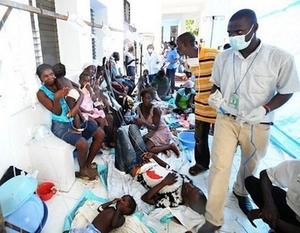EpidemicsCholera outbreak in Haiti projected to infect twice as many people
U.S. researchers fear that Haiti’s cholera epidemic could be far worse than initially projected; new models estimate that nearly 800,000 people will be infected with cholera, almost double initial estimates; nine months after the 7.0 magnitude earthquake that shook Haiti last year, cholera cases began to appear for the first time in nearly a hundred years; public health officials are currently debating how to stem the spread of cholera by pursuing vaccination, antibiotics, or sanitation; Harvard researchers are advocating for the use of all three

Haiti's cholera outbreak continues to worsen // Source: whatisthetrend.net
U.S. researchers fear that Haiti’s cholera epidemic could be far worse than initially projected. New models estimate that nearly 800,000 people will be infected with cholera, almost double initial estimates.
Nine months after the 7.0 magnitude earthquake that shook Haiti last year, cholera cases began to appear for the first time in nearly a hundred years.
The destruction of critical infrastructure like running water, large refugee camps, and the lack of clean water have exacerbated the situation and are spreading the disease. Cholera is an infection of the small intestine that causes severe diarrhea and without proper treatment can lead to death. It is primarily spread through contaminated water and food supplies.
The United Nations originally predicted that Haiti would suffer from 200,000 cases of cholera, but later amended that to 400,000 over the next year.
Harvard Medical school researcher Jason Andrews and his team recently published a new study that projects far greater numbers of cholera infections.
“In our model, we projected 779,000 cases of cholera and 11,000 deaths,” Andrews said.
He went on to say, “Our prediction right now is that it will be endemic in Haiti at least over the next year and for some time to come, which means that a significant number of people will continue to be infected with cholera.”
Andrews says his model differs from initial estimates because his prediction includes more sophisticated factors like assumptions about improving water supplies, vaccination, and the use of antibiotics.
Based on his analysis intervening could significantly reduce the impact of the cholera epidemic.
“Certainly, if more aggressive interventions were done, such as vaccinating a larger proportion of the population or a faster rollout of clean water, the impact of interventions could be greater,” he says.
Public health officials are currently debating how to stem the spread of cholera by pursuing vaccination, antibiotics, or sanitation.
“What we found was by doing all three of these interventions, you could avert a substantial burden of cholera and a substantial burden of deaths over the coming year, and that’s one of the main messages of my analysis,” Andrews concluded.
